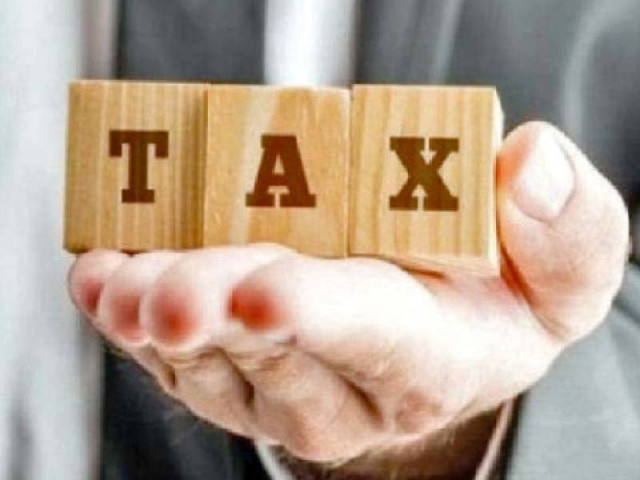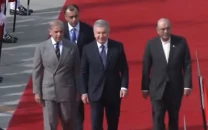Govt unleashes tax tsunami
Budget imposes taxes on various sectors, introduces penalties for non-filers and tax evasion

The government on Wednesday unveiled an unrealistic Rs18.9 trillion highly inflationary budget, aiming to keep political allies sweet with lavish spending promises while trying to appease the International Monetary Fund (IMF) with an unprecedented slew of new taxes.
The budget, a hefty 30% or Rs4.4 trillion jump from the previous year, is a fiscal balancing act that’s set to strain credulity. It boasts record-high allocations for interest payments, defence, and development, making any claim of fiscal consolidation a pipe dream.
The financial plan has doubled down on dependency on the lender’s hand, pushing the nation further into the lender’s lap, while tightening the screws on ordinary citizens.
Price hikes across the board—from petrol to milk, including infant formula – and steep new tax rates will take a sizeable bite out of household incomes due to abnormally high new tax rates.
Finance Minister Muhammad Aurangzeb, delivering the new coalition government’s maiden budget amid a cacophony of opposition protests, lacked in terms of the credibility of the numbers, particularly the record Rs13 trillion new tax collection target for the Federal Board of Revenue (FBR).
Adding to the confusion, Aurangzeb announced a primary budget surplus target of Rs1.241 trillion or 1% of GDP on the floor of the house. However, the budget books released by his ministry painted a different picture, showing a primary surplus target of Rs2.5 trillion or 2% of GDP.
Despite repeated inquiries, the Ministry of Finance left this glaring discrepancy unexplained.
Similarly, the Rs12.97 trillion tax target that the finance minister announced was not backed by the requisite additional revenue measures. There appears to be a hole of Rs800 billion between the measures the government took and what is required to hit the annual target.
This comes even though the government has imposed record additional taxes worth Rs1.5 trillion.
The finance minister has tried to appease the IMF by implementing most of the conditions. The quantum of the IMF demands was so huge that if the government implemented all the conditions the need for the additional taxes could have hit Rs2.3 trillion.
As a result, he has ended up with a budget that may not fully satisfy the IMF but will unleash an inflation tsunami.
This is the first budget in the history of Pakistan that has been prepared on the premise that there will be a shortfall in tax revenues and another mini-budget will soon follow the main budget.
The budget 2024-25 lacked an understanding of Pakistan’s economic conditions, as the government gave an expansionary spending plan and increased the subsidies allocations. The proposed subsidies of Rs1.36 trillion were 28% higher than this fiscal year.
In order to make room for this spending, it set an unrealistic tax collection target of Rs13 trillion that is likely to be missed despite imposing Rs1.5 trillion worth of additional taxes.
What appears to be unparalleled in Pakistan’s history, despite heavy taxation there is still a Rs800 billion gap against the measures taken in the budget and the new Rs12.970 trillion tax target.
“We will try to achieve our new tax target but in case there is a shortfall, the contingency measures have also been finalized,” said FBR Chairman Malik Amjad Zubair Tiwana in a press briefing.
Where the budget lacked the credibility, which could risk signing of the new deal, the government has also taken some welcoming steps including imposing a standard income tax on exporters and attempting to collect due taxes from the property and the retail sectors.
These three sectors would cumulatively pay an additional Rs320 billion in the next fiscal year.
The government has also banned the foreign travel of the non-filers of income tax returns except for Hajj. Similarly, a 75% higher tax on mobile phone calls of those who would not file the returns despite receiving notices has also been imposed.
The government has also proposed to seal the shop of the traders who would not file income tax returns, including imprisonment for six months. On tax evasion of over Rs500 million, a five-year jail term is proposed in the budget. In case of over Rs1 billion worth of fraud, the jail term will be for 10 years.
In yet another drastic measure, the non-filers banking payments would also fall under the category of a maximum Rs50,000 transaction liable to 0.6% tax. These transactions include utility bill payments.
There was a double jeopardy for the finance minister who had to wait for half an hour due to the boycott of the Pakistan Peoples Party (PPP).
At the request of Deputy Prime Minister Ishaq Dar, the PPP only sent its three senior members to the National Assembly.
Aurangzeb had to face rowdy Pakistan Tehreek-e-Insaf (PTI) but the new finance minister was admirably confident and did not shake despite the ruckus by the opposition. The PPP is not happy over taxation in the agriculture sector.
The government has itself unleashed the inflationary storm as it has increased the petroleum levy rate from Rs60 to Rs80 per litre to collect an additional Rs321 billion under this head. The new petroleum levy collection target is now Rs1.281 trillion.
A Rs15 per kg tax has been imposed on the supply of sugar to commercial dealers and beverage producers.
The packaged milk has been slapped with 18% GST, including infant milk. The government has not even spared the students and imposed an 18% tax on stationary and 10% on computers. The DAP fertilizer is now subject to 18% GST. The tractors are also taxed at 18%.
The only solace for the government employees was a 25% increase in salaries for grades 1 to 16 and 20% for grades 17 to 22. The pensions have been increased by 15%. However, such an increase is not available to the private sector who are worst hit by abnormal increases in their income taxes and massive indirect taxation in the budget.
Muhammad Aurangzeb did not announce the abolition of any federal ministry despite suggesting this during a meeting of the National Economic Council (NEC).
The federal government will borrow a record Rs8.5 trillion to finance the inflationary and expansionary budget, as it shied away from cutting the expenditures even where there was room, like development and subsidies.
The Rs8.5 trillion borrowing for budget financing will keep the government dependent on the banks and foreign lenders.
The size has enlarged after the Ministry of Defense and the Ministry of Planning sought an increase in their allocations to meet next fiscal year’s development and defence needs.
The massive increase in the size of the budget does not reflect the harsh economic ground realities, but the finance ministry’s hands are tied due to the IMF’s insistence on Rs9.8 trillion allocations for interest payments.
The interest payments will eat 52% of the budget and the federal government’s net income –after paying the provincial shares –will only be Rs602 billion more than interest payments. Even this Rs602 billion expected remaining income hinges upon the achievement of the unrealistic FBR target of Rs13 trillion.
The next year’s interest payments are estimated at a whopping Rs9.775 trillion. The Rs9.775 trillion interest cost is 34% or Rs2.5 trillion higher than this year’s original budget.
Another major expense is the defence budget of around Rs2.1 trillion and a special defence package of Rs400 billion. The total allocations for the military would now stand at Rs3.2 trillion, including Rs662 billion for the military pensions. The military will get 17% of the total budget.
The grant amount for the next fiscal year has swelled to Rs1.78 trillion, including need for the defence procurements
The government has proposed the new Public Sector Development Programme (PSDP) at Rs1.4 trillion, about Rs450 billion or 47% more than this year’s original budget.
The finance minister announced an Rs593 billion BISP programme aimed at expanding the net to 10 million beneficiaries and adding more children to the conditional cash transfer programmes.
The minister also announced a Rs20 billion budget for the digital information infrastructure project –a plan that is aimed at erecting social media firewalls being imported from China.
Resources
The FBR’s tax target is Rs13 trillion—an increase of Rs3.8 trillion or 40% over this year’s revised target.
The FBR chairman said that the new tax measures were worth Rs1.5 trillion. The government would collect another Rs1.5 trillion through inflationary factors. But the remaining Rs800 billion additional collection is dependent upon better enforcement and settlement of court cases in favour of the FBR
The government has proposed Rs4.85 trillion in non-tax revenues for the next fiscal year –higher by 64%. The non-tax revenue would depend upon Rs2.5 trillion expected profit by the State Bank of Pakistan (SBP) and another nearly Rs1.3 trillion on account of petroleum levy.
Despite tall claims in the budget speech about undertaking reforms, the government has set the privatisation proceeds target at a mere Rs30 billion. The finance minister said that the government wanted to privatize the PIA, the Roosevelt Hotel, The House Building Finance Corporation, the First Women Bank and the power distribution companies.
The hole
The Rs18.9 trillion budget’s envelope will be funded by taking about Rs8.5 trillion in loans from local and international creditors. The federal budget deficit is projected to be around 6.9% of the gross domestic product. The projected federal deficit is 00% higher than this year’s original estimates.
The overall deficit target is 5.9% of the GDP or Rs7.3 trillion on the back of Rs1.2 trillion provincial savings.





















COMMENTS (1)
Comments are moderated and generally will be posted if they are on-topic and not abusive.
For more information, please see our Comments FAQ